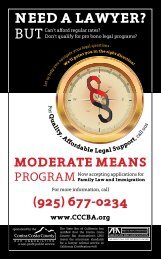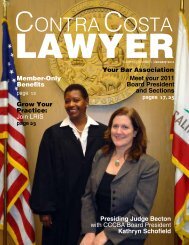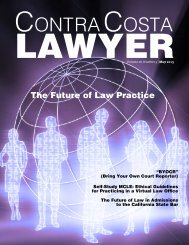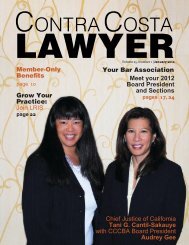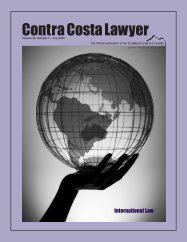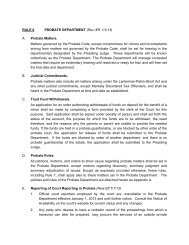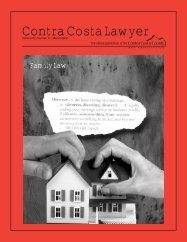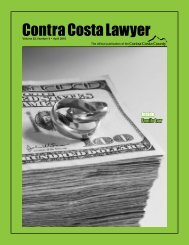Alternative Dispute Resolution Issue - Contra Costa County Bar ...
Alternative Dispute Resolution Issue - Contra Costa County Bar ...
Alternative Dispute Resolution Issue - Contra Costa County Bar ...
You also want an ePaper? Increase the reach of your titles
YUMPU automatically turns print PDFs into web optimized ePapers that Google loves.
Ethical Risk Areas for MediationConflicts of InterestClient AuthorityClient Expectationsby Linda DeBeneConfidential CommunicationsNegotiation StrategiesWe all see it. It is so commonplace that most of us do not blink an eye. It seems that just about every day there is anothernews article about it — ethics (or lack thereof) in or related to the law. Unethical judges throwing cases, taking money,acting out in courtrooms, harassing staff; politicians involved in unethical behavior in their official / personal lives;unbelievable Ponzi schemes that run rampant over legal ethics/accounting rules; foreclosure counselors (including lawyers)taking money from the disadvantaged for promised services that are never performed; “trusted” sons / daughtersabusing elderly parents aided by intentional unethical/illegal acts of attorneys / accountants. Ethics is front page news.While it is ADMittedly RAREto see a news article about ethical dilemmasfaced by mediators in daily practice, theyare more common than one would think.Bearing in mind that mediators are leftalone to resolve issues relating to “ethicalconflicts” raised as a result of acts ofcounsel vis-a-vis their clients or opponentsin mediation, it is important to alertpractitioners to some of these issues inlight of the current ethical (or unethical)climate de jour.Most mediators typically see (andcan handle with relative aplomb) skillsdilemmas — knowing how to implementaction in a mediation setting but not beingcertain about the effect it may have —while ethical / moral conflicts arise moreinfrequently. In the latter instance, themediator is uncertain as to how to implementor choose a course of action withoutdoing harm, possibly unwittingly, to anopposing party involved in the conflict.A mediator, for example, is presented withuse of mediation by a party solely to gaininformation, win time, or intimidate.Consider being at mediation in privatecaucus and one side’s attorney commentsthat s/he has no authority, adding “we areat mediation purely to see how low theother side will go.”What are some typical issues presentedto the mediator by such actions of counsel?Of course one thinks immediately of abuseof the process or lack of good faith negotiation,obvious first complaints raised bythe opponent. However, failure to followdirectives of a mediator or court for personalattendance of representatives withsettlement authority can be the thorniestproblem a mediator faces. Courts makerules about attendance, but rarely act toenforce them. So what are mediators todo? In light of counsel’s conduct (ethical?not ethical?), what course of action isproper for the mediator to take?The obligations of counsel making sucha statement are ethical minefields. Privatecounsel usually bring a client with authorityto decide, but often without money topay. Insurance counsel are supposed torepresent the client, but have seriousconflicts with loyalty. Many carriers havecaptive / house counsel, or outside insurancecounsel, with a potential desire formore / continued business from carriers.Thus, for example, they do not push hardenough to have carrier representatives atthe sessions, or they have written liabilityreports that lean in favor of “no liability”reporting, resulting in small or no reserves.So who is being served?Dealing with such ethical conflicts callsfor a skill set that often goes beyondtypical mediation training. Procedurally,ethical conflicts have to be analyzed bythe mediator on the spot, considering firstwhether the mediator is a judicial or quasijudicialofficer (pro-tem or referee withpower to conduct settlement conferences).The mediator then has to decide whetherany reporting can be done to the courtunder California (or applicable federal)statute or rule, or by stipulation of theparties. Or, alternatively, is the mediatoronly a passive facilitator — the “hallmonitor” — moving information backand forth without any “hammer” or18 November 2009



